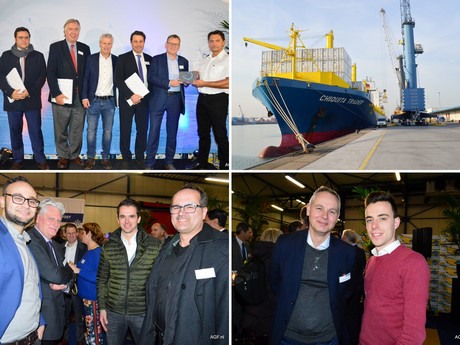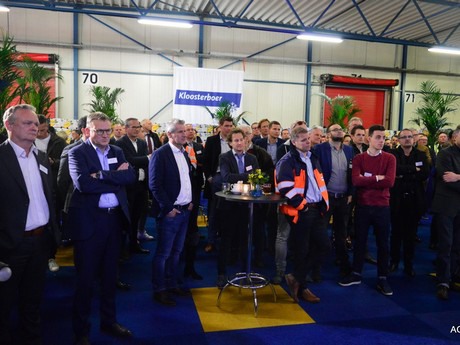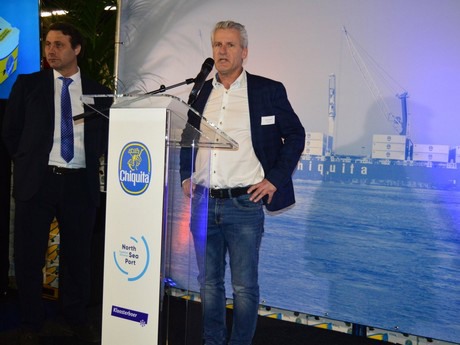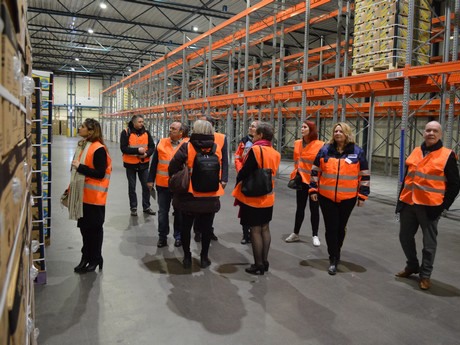A few days ago, the Chiquita Trader lay docked at the port of Vlissingen. Cranes hoisted the containers from the ship and placed them on a chassis. The reefers were then piloted to the storage area. This ship arrived at this harbor on Monday, 18 February.
This made it the first fully containerized Chiquita ship to dock at this port, located on the coast of the Dutch province of Zeeland. The Chiquita Trader was festively received by the Dutch company, Kloosterboer. “It is the beginning of a new era," both Stefano di Paulo from The Great White Fleet and Kloosterboer's Jack Kloosterboer emphasized.

Click here to see the photo report.
“In the 60s, Chiquita had the largest reefer fleet in the world. We have, however, been following the changes in the market", says Stefano di Paolo. He is the Director of The Great White Fleet, Chiquita Brands International's shipping division. These changes mean Chiquita has been following the trend toward containerization.
Earlier all of Chiquita's transport to the United States became containerized. Since this year, this company's transport vessels to Europe has also been entirely containerized. To make this happen, Chiquita invested in two new reefer container ships. These Full Reefer Capacity Ships are known as the Chiquita Trader and Chiquita Express. Three other ships were also charted for the route to Europe.
These ships sail on a schedule that guarantees weekly arrivals at Vlissingen. This change in schedule means that instead of bi-weekly arrivals, bananas now arrive on a weekly basis. The container ships have the capacity of two reefer ships. This ensures the total volume supplied remains unchanged.

Click here to see the photo report.
“We have not only invested in new ships. We have invested in 7.000 new Controlled Atmosphere (CA) containers too. Most of these are MCI containers,” continues Stefano. These containers are equipped with state-of-the-art technology for refrigerated transport. This new generation of reefers use a third less energy than their predecessors. Each container offers space for 1.080 boxes of bananas.
“We are the only banana company that has completely containerized its transport," says Stefano. The ships sail between Costa Rica, Panama, and the port of Vlissingen. The bananas are then transported from Vlissingen using Unifeeder and Samskip's short sea services. They are shipped to Sheerness in the United Kingdom and Oslo. Norway. They also go to the Swedish port of Helsingborg as well as Helsinki in Finland.

Click here to see the photo report.
Dockside automation
“We use less refrigerated storage at the terminal. This is because we can store the bananas better in the CA containers,” explains Stefano. This offers opportunities for Kloosterboer. They can now attract new business for this cold storage space. This containerization also demands investment from this company as well as the port
"The old reefer ships hold a certain kind of nostalgia. However, we have to adjust to this new era," says Jack Kloosterboer. In the plans he presented, it seems that Kloosterboer has skipped the present. The company appears to have stepped directly into the future with its automated container depot.
“In order to keep the bananas in the CA containers for as long as possible, demands a new way of thinking," he explains. The company has invested in a new container warehouse. The almost fully-automated area is to be used to store full containers. In Jack's plans, the offloaded containers will be placed on chassis. These containers will then be automatically transported to the depot.
Once there, the reefers will be placed in storage by four RTGs (Rubber Tyred Gantry Cranes). They will be supplied with electricity so the cooling motors can keep running. "We want to automate as much of it as possible," he goes on to say. It is a massive investment of 'several tens of millions'.

Click here to see the photo report.
The port that specializes in reefers
These plans have not yet been put into action. For now, the containers are being stored connected to plugs. There is room for 1.000 containers. An additional five hectares of land has been prepared to store the empty containers. Kloosterboer and the North Sea Port want to develop the port into a specialized reefer terminal.
With the help of a CMA CGM, all onions are shipped to Africa in containers. There have also been previous arrivals of South African grapes and citrus from Latin American. “We want to become a specialist port for fruit and fruit juices," says Daan Schalck of the North Sea Port.
This port area's figures from last year showed strong growth. In 2015, the North Sea Port processed less than a million tons of product. Last year, this volume rose to about 1,4 million tons. The port company is going to invest in an expansion of the port. This will include space for two additional ships at the terminal. These plans have been put in place in order to keep up with Kloosterboer's growth ambition.
An extra 3,6 hectares of land has also been allocated for this expansion. "We do not want to compete with the large ports. We rather want to be a specialized port for reefer containers,” Daan concludes.
Between the boxes of bananas, the guests at the occasion enjoyed snacks and drinks. During a tour of the terminal, they got a glimpse of the logistical process the bananas undergo. Those who ventured outside found themselves right on the dock. Here, the unloading of the Chiquita Trader continued.
In a fluid motion, the crane sets the banana container on a chassis. The reefer is then taken to the storage area. Within a few days, these bananas found themselves on a store shelf somewhere in Europe. By today, Wednesday, 20 February, the ship will make its way back toward Latin America to collect a fresh load of bananas.
For more information:
Nicole Coens Kloosterboer Vlissingen
Kloosterboer Vlissingen
10 Finlandseweg
4455 TE Nieuwdorp
Tel: +31 (0) 118 486 200
www.kloosterboer.com  Chiquita Nederland
Chiquita Nederland
35 Franklinweg
4207 HX Gorinchem
+31 (0) 183 692 333
www.chiquita.nl
